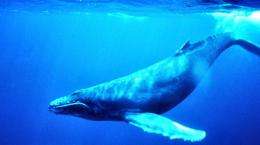August 10, 2016 report
Humpback whales saving other species from orcas found to be common and maybe altruistic

A team of researchers led by Robert Pitman, a marine ecologist with NOOA Fisheries' Southwest Fisheries Science Center, has found evidence that suggests humpback whales may engage in altruistic behavior during encounters with killer whales attacking other marine species. In a paper available on the open access site Marine Mammal Science, the team describes their analysis of humpback whale encounters with killer whales and why they believe it is possible the whales are intentionally helping other creatures to escape certain death by orcas.
The research began, the team notes, when Pitman observed a humpback whale come to the rescue of a seal after a pod of killer whales had knocked it off an ice floe back in 2009. Also, another team member had witnessed a group of humpback whales driving off a pod of killer whales that had killed a grey whale pup—they surrounded it and prevented the orcas from eating it for several hours. Such incidents prompted the group to look a little deeper—they conducted searches of both published and unpublished papers detailing humpback observations and discovered among them 115 incidents of humpback whales rescuing other creatures from orca attacks. They noted that just 11 of the incidents involved rescuing humpback whale calves—the rest involved rescuing a variety of other marine creatures such as sea lions, gray whales, sunfish and harbor seals.
The researchers found that many of the humpback whales that engaged in rescue attempts had scars on their bodies, indicating that they were survivors of orca attacks in their youth—it seemed plausible that they were simply responding to an unpleasant memory.
The team notes that humpback whales are the only cetaceans (marine mammals that include dolphins, porpoise and whales) known to drive off killer whales under any circumstances—they regularly do so to protect their young. They suggest it might be accidental, as the whales have learned to respond to the sounds killer whales make when attacking—saving members of another species just occurs naturally as they seek to protect their own.
After considering all of the possibilities, the team has concluded that altruism "could not be ruled out." The humpback whales might do it simply because they see another creature under duress and wish to help.
More information: Robert L. Pitman et al. Humpback whales interfering when mammal-eating killer whales attack other species: Mobbing behavior and interspecific altruism?, Marine Mammal Science (2016). DOI: 10.1111/mms.12343
Journal information: Marine Mammal Science
© 2016 Phys.org

















